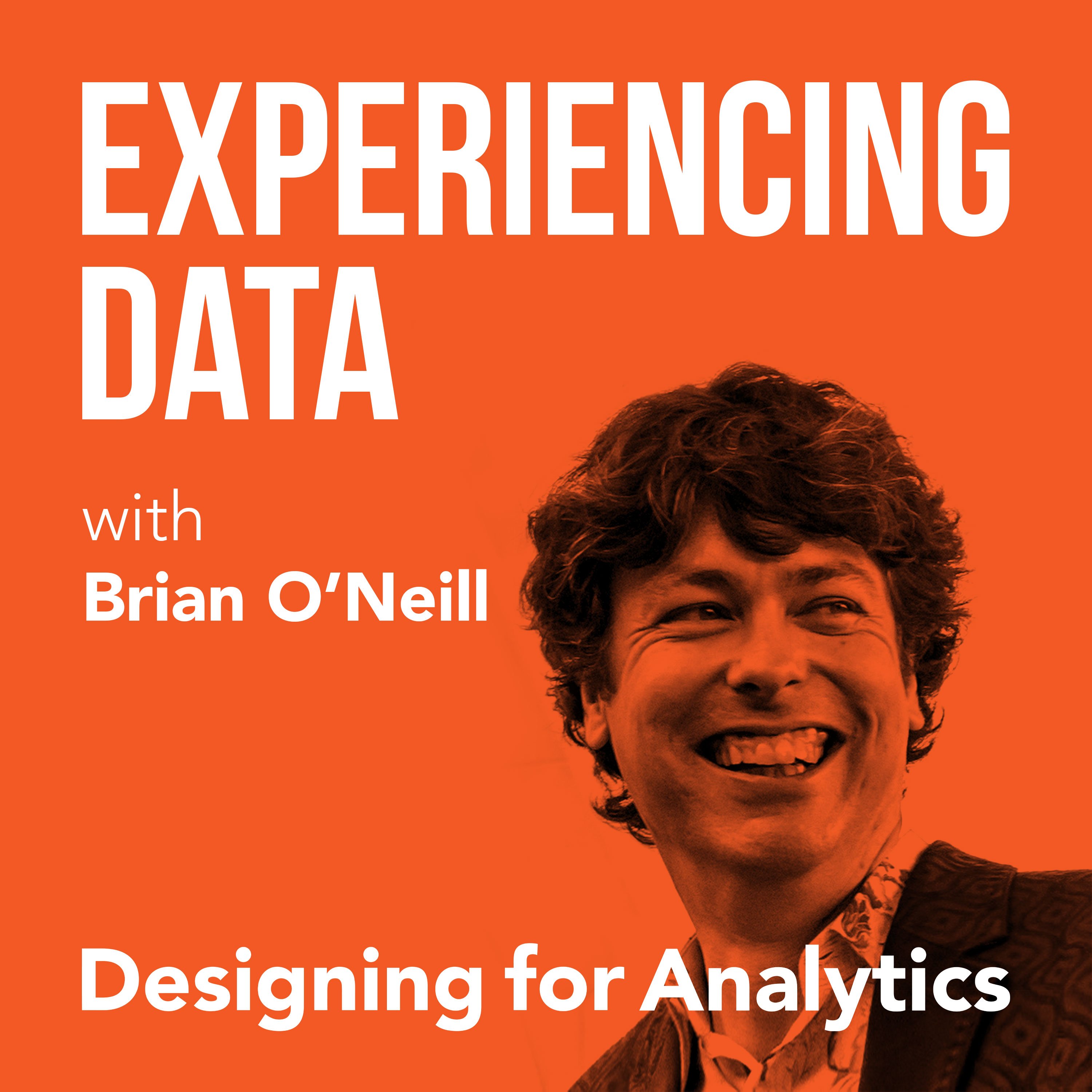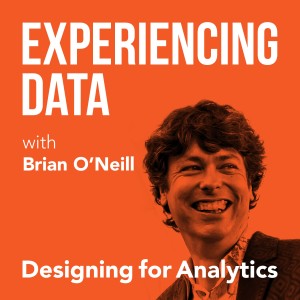

147.6K
Downloads
179
Episodes
Is the value of your enterprise analytics SAAS or AI product not obvious through it’s UI/UX? Got the data and ML models right...but user adoption of your dashboards and UI isn’t what you hoped it would be?
While it is easier than ever to create AI and analytics solutions from a technology perspective, do you find as a founder or product leader that getting users to use and buyers to buy seems harder than it should be?
If you lead an internal enterprise data team, have you heard that a ”data product” approach can help—but you’re concerned it’s all hype?
My name is Brian T. O’Neill, and on Experiencing Data—one of the top 2% of podcasts in the world—I share the stories of leaders who are leveraging product and UX design to make SAAS analytics, AI applications, and internal data products indispensable to their customers. After all, you can’t create business value with data if the humans in the loop can’t or won’t use your solutions.
Every 2 weeks, I release interviews with experts and impressive people I’ve met who are doing interesting work at the intersection of enterprise software product management, UX design, AI and analytics—work that you need to hear about and from whom I hope you can borrow strategies.
I also occasionally record solo episodes on applying UI/UX design strategies to data products—so you and your team can unlock financial value by making your users’ and customers’ lives better.
Hashtag: #ExperiencingData.
JOIN MY INSIGHTS LIST FOR 1-PAGE EPISODE SUMMARIES, TRANSCRIPTS, AND FREE UX STRATEGY TIPS
https://designingforanalytics.com/ed
ABOUT THE HOST, BRIAN T. O’NEILL:
https://designingforanalytics.com/bio/
Episodes

Tuesday Dec 10, 2024
Tuesday Dec 10, 2024
After getting started in construction management, Anna Jacobson traded in the hard hat for the world of data products and operations at a VC company. Anna, who has a structural engineering undergrad and a masters in data science, is also a Founding Member of the Data Product Leadership Community (DPLC). However, her work with data products is more “accidental” and is just part of her responsibility at Operator Collective. Nonetheless, Anna had a lot to share about building data products, dashboards, and insights for users—including resistant ones!
That resistance is precisely what I wanted to talk to her about in this episode: how does Anna get somebody to adopt a data product to which they may be apathetic, if not completely resistant?
At the end of the episode, Anna gives us a sneak peek at what she’s planning to talk about in our final 2024 live DPLC group discussion coming up on 12/18/2024.
We covered:
- (1:17) Anna's background and how she got involved with data products
- (3:32) The ways Anna applied her experiences working in construction management to her current work with data products at a VC firm
- (5:32) Explaining one of the main data products she works on at Operator Collective
- (9:55) How Anna defines success for her data products
- (15:21) The process of designing data products for "non-believers"
- (21:08) How to think about "super users" and their feedback on a data product
- (27:11) How a company's cultural problems can be a blocker for product adoption
- (38:21) A preview of what you can expect from Anna's talk and live group discussion in the DPLC
- (40:24) Closing thoughts from Anna
- (42:54) Where you can find more from Anna
Quotes from Today’s Episode
- “People working with data products are always thinking about how to [gain user adoption of their product]... I can’t think of a single one where [all users] were immediately on board. There’s a lot to unpack in what it takes to get non-believers on board, and it’s something that none of us ever get any training on. You just learn through experience, and it’s not something that most people took a class on in college. All of the social science around what we do gets really passed over for all the technical stuff. It takes thinking through and understanding where different [users] are coming from, and [understanding] that my perspective alone is not enough to make it happen.” - Anna Jacobson (16:00)
- “If you only bring together the super users and don’t try to get feedback from the average user, you are missing the perspective of the person who isn’t passionate about the product. A non-believer is someone who is just over capacity. They may be very hard-working, they may be very smart, but they just don’t have the bandwidth for new things. That’s something that has to be overcome when you’re putting a new product into place.” - Anna Jacobson (22:35)
- “If a company can’t find budget to support [a data product], that’s a cultural decision. It’s not a financial decision. They find the money for the things that they care about. Solving the technology challenge is pretty easy, but you have to have a company that’s motivated to do that. If you want to implement something new, be it a data product or any change in an organization, identifying the cultural barriers and figuring out how to bring [people in an organization] on board is the crux of it. The money and the technology can be found.” - Anna Jacobson (27:58)
- “I think people are actually very bad at explaining what they want, and asking people what they want is not helpful. If you ask people what they want to do, then I think you have a shot at being able to build a product that does [what they want]. The executive sponsors typically have a very different perspective on what the product [should be] than the users do. If all of your information is getting filtered through the executive sponsor, you’re probably not getting the full picture” - Anna Jacobson (31:45)
- “You want to define what the opportunity is, the problem, the solution, and you want to talk about costs and benefits. You want to align [the data product] with corporate strategy, and those things are fairly easy to map out. But as you get down to the user, what they want to know is, ‘How is this going to make my life easier? How is this going to make [my job] faster? How is it going to result in better outcomes?’ They may have an interest in how it aligns with corporate strategy, but that’s not what’s going to motivate them. It’s really just easier, faster, better.” - Anna Jacobson (35:00)
Links Referenced
LinkedIn: https://www.linkedin.com/in/anna-ching-jacobson/
DPLC (Data Product Leadership Community): https://designingforanalytics.com/community
No comments yet. Be the first to say something!